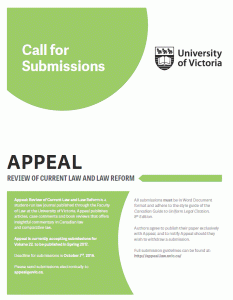 Appeal: Review of Current Law and Law Reform is currently accepting submissions for volume 22, to be published in Spring 2017.
Appeal: Review of Current Law and Law Reform is currently accepting submissions for volume 22, to be published in Spring 2017.
Appeal is a student run law journal published at the University of Victoria’s Faculty of Law. Appeal publishes articles, case comments and book reviews offering insightful commentary on Canadian law and comparative law.
The deadline for submissions is October 7, 2016. Send submissions electronically to appeal@uvic.ca. For further details including submission guidelines visit the Appeal website.


